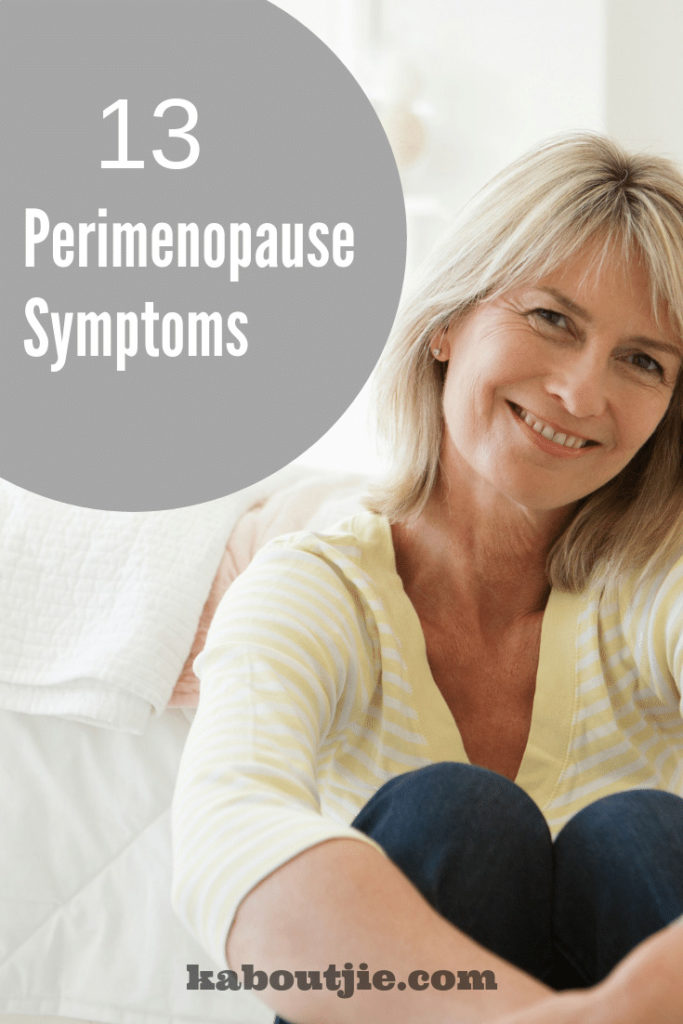Perimenopause is referring to “around menopause” and is the time period during which your body is transitioning and preparing for menopause which marks the end of your reproductive years. Perimenopause is also named menopausal transition.
Perimenopause or the menopause transition that your body goes through starts several years before you enter menopause. Your ovaries gradually start producing less estrogen (the main female hormone) and this transition begins in your early forties and sometimes as early as your thirties. The level of estrogen in your body generally will start rising and falling unevenly when you enter perimenopause. Menstrual cycles may shorten or lengthen and you may even stop ovulating during some menstrual cycles (not releasing an egg).
Perimenopause symptoms last up until menopause sets in when your ovaries completely stop releasing eggs. Treatment for these symptoms are available. During the last one to two years of perimenopause the drop in your estrogen levels will significantly rise. During this stage, many women experience menopause symptoms.

How long is the perimenopause stage?
The average period of time of perimenopause is usually around four years. It varies from woman to woman. Some may go through perimenopause for a few months while for others it may continue for ten years. Perimenopause will come to an end once you’ve gone without your monthly cycle for twelve consecutive months.
13 Perimenopause symptoms
Women who goes through perimenopause will experience subtle or more pronounced changes in their bodies and will have symptoms that may include:
- Breast tenderness.
- More severe premenstrual syndrome.
- Decreased sex drive or changing sexual function – During perimenopause, your desire for sex or sexual arousal may experience a change. However, if you had pleasing sexual intimacy before menopause, it is likely that it will continue throughout perimenopause and after.
- Hot flashes or night sweats – This is common during perimenopause and the length, intensity and frequency may be varied.
- Periods which are irregular – As ovulation becomes more erratic, the timespan between cycles may be shorter or longer and your flow may be heavier or lighter. Sometimes you may even skip a period. When you experience a persistent fluctuation of seven days or more in the length of your period, you may be in the early stages of perimenopause. If you have a space of sixty days or longer between cycles, you’re most likely in the late stage of perimenopause.
- Discomfort during sex and vaginal dryness – When your estrogen levels fall, your vaginal tissues may lose elasticity and lubrication which can lead to discomfort during intercourse.
- Vaginal and bladder issues – The drop in estrogen levels can leave you at risk for contracting urinary or vaginal infections. The loss of tissue tone may lead to urinary incontinence and you may experience urinary urgency or urine leakage when sneezing or coughing.
- Mood swings – Irritability, an increased risk of depression and mood swings may occur during perimenopause. It may be due to sleep deprivation associated with night sweats and hot flashes or related to hormonal changes that your body is going through.
- Insomnia – having trouble with sleeping are often due to night sweats or hot flashes, but it happens that sleep cycles become unstable even without them.
- Declining fertility – As ovulation becomes erratic, your capacity to conceive lowers. As long as you have cycles, pregnancy is still a possibility, therefore if you’re not planning to have any more children, you must still continue using birth control until you’ve had no periods for twelve months.
- Loss of bone – You may be at risk of osteoporosis due to your declining estrogen levels.
- Fluctuating cholesterol levels – the diminishing estrogen levels may lead to undesirable changes in blood cholesterol levels including low-density LDL cholesterol (bad cholesterol) which can increase your risk of heart disease. However, high-density HDL cholesterol (good cholesterol) also start decreasing in some women as they get older which is also a factor that leads to heart disease.
When are perimenopausal symptoms a cause for concern?
It is normal to experience irregular monthly cycles when you’re going through perimenopause, but other conditions may cause a change in your menstrual bleeding. If any of these situations are applicable to you, you may need to see your doctor to rule out other causes:
- Your periods have blood clots or are very heavy and you need to change tampons or pads at every hour or two.
- Your periods last for numerous days, longer than usual (more than seven days).
- You have spotting in between periods.
- You experience spotting after sexual intercourse.
- Your periods are occurring closer together (regularly for less than twenty-one days apart).
These signs may indicate a problem with your reproductive system that will require diagnosis and treatment. Reasons of abnormal bleeding may include hormonal issues, pregnancy, fibroids, birth control, blood clotting problems and sometimes, but rarely, cancer.
How is perimenopause diagnosed in women?
The diagnosis of perimenopause by a doctor is often made based on your symptoms. A blood test for checking hormone levels may help, but hormone levels are changing when you’re going through perimenopause. It is better to have several blood tests performed during different times for comparison.
Factors that may speed-up perimenopause
Evidence suggests that specific factors may contribute to some women starting perimenopause at an earlier age:
- Smoking – the onset of menopause may happen one or two years earlier in women who smoke as opposed to women who are non-smokers.
- Family history – if women in your family have experienced menopause early, then it’s possible that you may also experience it at an earlier stage.
- Cancer treatment – such as pelvic radiation therapy or chemotherapy has been linked to early menopause.
- Hysterectomy – although you no longer have periods after a hysterectomy, your ovaries still produces estrogen. The surgery however, may lead to early menopause. In addition, if you had one ovary removed, the remaining ovary may stop working sooner than expected.
Conclusion:
Perimenopause is a normal phase in a woman’s life. However, if your symptoms are interfering with your overall well-being and quality of life or you’re experiencing changes in your sexual function that are a cause of concern to you, then you should see your doctor.
 Kaboutjie SA Mommy Blogs by Lynne Huysamen
Kaboutjie SA Mommy Blogs by Lynne Huysamen





Thank You for this brilliant post. It’s exactly the information I was looking for. I’ve been suspecting I’m in perimenopause for a while as my periods have been so erratic. And my last period went on for 2 weeks so I went to check it out with the Doc.
I thought she would just confirm that I’m in perimenopause and all would be well but she did a pap smear and sent me to Radiology for further tests to rule out fibroids, endometriosis and Cancer. Was a bit of a scare but luckily all results came through clear. YAY! Reading through these symptoms, I’m more convinced than ever that it’s just perimenopause. That explains the irritability and low sex drive then too.
Anyway, my Doc has put me on the mini pill for 6 months to regulate my periods. Let’s see how that goes.
Oh yeah I am so with you on this Lauren – I have had such bad PMS too which has never been an issue before! Good luck with getting regulated.
Thank you sharing this important information
Thank you..In my late 30s,not experiencing this yet,but my mom and sister went through menopause early in life,so I was paranoid..Good to know the signs.Thank you so much for sharing..
Thank you for the information I think tht I’ve also experienced the perimenopause. So WHT can I use please
If you are going through perimenopause you can try some of these natural remedies for perimenopause symptoms or alternatively contact your doctor.
I’m 42 and don’t have any yet, thank you so informative
I can’t wait to get menopause really. I don’t like getting my period. After giving birth, it took 10 months before 9 could get my period. I thought to myself yes it’s gone. Only to wake up and find it there.
I really found this read particularly helpful as it gave me a lot of insight in what I’m busy experiencing and struggling to deal with a lot of the symptoms
Well this is something I am most definitely not looking forward to😐.
Thank you so much for this information I am 100% going to need this. 🤗🌻
I’m certainly in the pre-menopause stage and I’m not looking forward to it either! Although the end result of not having periods anymore sounds fantastic!
I’m going through 4 of the symptoms already because of medication but still far from that period in my life. Atleast I know what to expect now. Thank you